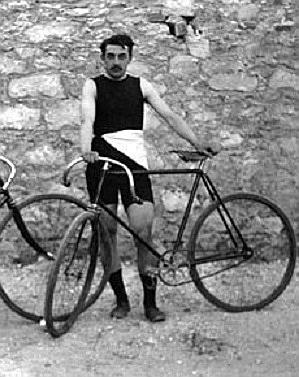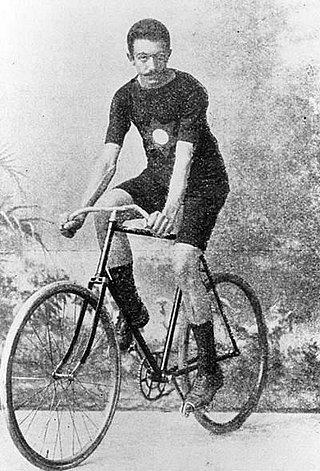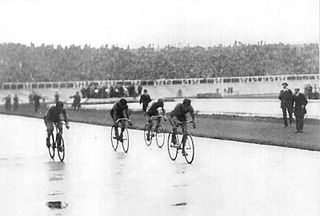
The 1896 Summer Olympics, officially known as the Games of the I Olympiad and commonly known as Athens 1896, was the first international Olympic Games held in modern history. Organised by the International Olympic Committee (IOC), which had been created by French aristocrat Pierre de Coubertin, it was held in Athens, Greece, from 6 to 15 April 1896.
The men's track time trial in Cycling at the 2004 Summer Olympics was a time trial race in which each of the 17 cyclists from 13 nations attempted to set the fastest time for four laps of the track. Nations were limited to two cyclists each. The event was won by Chris Hoy of Great Britain, the nation's second consecutive victory in the men's track time trial. Arnaud Tournant of France earned silver after a disappointing fifth-place finish four years earlier. Stefan Nimke put Germany on the podium for the second consecutive Games with his bronze.

Paul Michel Pierre Adrien Masson was a French cyclist who raced at the 1896 Summer Olympics in Athens.

Felix Adolf Schmal was an Austrian fencer and racing cyclist. He was born in Dortmund and died in Salzburg. He competed at the 1896 Summer Olympics in Athens.
Edward Battell was a British racing cyclist. He competed at the 1896 Summer Olympics in Athens.

Marie Léon Flameng was a French cyclist and a World War I pilot. He competed at the 1896 Summer Olympics in Athens, winning three medals including one gold.
Aristidis Konstantinidis was a Greek racing cyclist. He competed at the 1896 Summer Olympics in Athens.
Georgios Koletis was a Greek cyclist. He competed at the 1896 Summer Olympics in Athens, winning a silver medal.

Georgios Paraskevopoulos was a Greek cyclist. He participated in the 1896 Summer Olympics in Athens. Paraskevopoulos competed in the 12 hour race and the road race. According to the data provided by the official website of the Olympic Games, Paraskevopoulos did not finish the 12 hour race and there is no third winner. However, according to the Hellenic Olympic Committee, Paraskevopoulos did finish, and therefore is recognised by HOC as bronze medalist, having completed 940 laps of the Neo Phaliron Velodrome. This is supported by a short article in a Greek newspaper on the following day.

France competed at the 1896 Summer Olympics in Athens, Greece, from 6 to 15 April 1896. French athletes had appeared in every Summer Olympic Games of the modern era, alongside Australia, Great Britain, and Greece. France won the fourth-most gold medals with 5 and the fourth-most total medals with 11. Cycling was the sport in which the French competitors had the most success, as they completely dominated the field. The French team had 27 entries in 18 events, winning 11 medals.

The men's time trial was one of 5 track cycling events on the Cycling at the 1896 Summer Olympics programme. It was the fourth event on the cycling schedule and was held on 11 April. The first time trial competition was the only time that Olympic time trials were held over the distance of one-third of a kilometre; when the event returned to the programme at the 1928 Summer Olympics the distance was set at one kilometre.

The men's sprint was one of the five track cycling events on the Cycling at the 1896 Summer Olympics programme. It was held on 11 April as the second event on the schedule. It was held over the distance of 2 kilometres, or six laps of the track. The event was won by Paul Masson of France, with his teammate Léon Flameng earning bronze. Stamatios Nikolopoulos of Greece took silver

The men's 10 kilometres was one of the five track cycling races on the Cycling at the 1896 Summer Olympics programme. It was held on 11 April and comprised 30 laps of the track. The 1896 Games was the only time that the 10 kilometres track race was part of the cycling program at an Olympic Games. Six cyclists from four nations competed. The event was won by Paul Masson of France, the second of his three victories that day. His countryman Léon Flameng finished second, while Austrian Adolf Schmal was third.

The men's 12 hour race was one of five track cycling events on the Cycling at the 1896 Summer Olympics programme. It was the final event of the 1896 Summer Olympics, ending at 5 p.m. on 13 April. Seven cyclists from four nations started. The event was won by Adolf Schmal of Austria, the only gold medal in cycling ever won by the nation, until Anna Kiesenhofer's win in the 2020 Women's Road Race. Schmal lapped silver medalist Frederick Keeping of Great Britain early, winning by that lap as the two were the only riders to finish. The 12 hour race was the last event to finish at the 1896 Games.

The men's road race was the only road cycling event on the Cycling at the 1896 Summer Olympics programme. The course was 87 kilometres long and the race was held on 12 April. Seven cyclists from three nations competed. The event was won by Aristidis Konstantinidis of Greece. August von Gödrich of Germany took second, while Edward Battell finished third.

The men's 25 kilometres was one of three cycling events, all track cycling, on the Cycling at the 1900 Summer Olympics programme that were open to all amateurs, had more than one nation participating and no handicapping. It was held on 15 September. Ten cyclists competed. Four had already competed in the sprint event. The result of the race proved Louis Bastien of France to be the top long-distance cyclist present, while Lloyd Hildebrand finished in second and Auguste Daumain in third. One of the contestants, Louis Trousselier, would go on to win the 1905 Tour de France. Prizes were awarded to the top four finishers: art objects valued at 400 francs, 300 francs, 200 francs (third), and 100 francs (fourth).

The men's 100 kilometres was one of seven track cycling events on the Cycling at the 1908 Summer Olympics programme. Its distance was the longest of the individual event distances. A challenge cup was presented by the Prince of Wales to the winner. There were 43 competitors from 11 nations. Each nation could enter up to 12 cyclists. The event was won by Charles Henry Bartlett of Great Britain, with his countryman Charles Denny finishing second. Octave Lapize earned bronze, making France the only nation to have medalists at both appearances of the 100 kilometres race.

The men's track time trial in Cycling at the 1992 Summer Olympics was a time trial race in which each of the thirty-two cyclists attempted to set the fastest time for four laps of the track. The race was held on Monday, July 27 at the Velòdrom d'Horta. Adler Capelli rode a bike that allowed for a single gear change, a first for an Olympic track event. There were 32 competitors from 32 nations, with each nation limited to one cyclist. The event was won by José Manuel Moreno of Spain, the nation's first medal in the men's track time trial. The United States also earned its first medal in the event, with Erin Hartwell's bronze. Shane Kelly took Australia's second consecutive silver medal in the track time trial.

The cycling competitions of the 2016 Summer Olympics in Rio de Janeiro were held at four venues scheduled to host Eighteen events between 6 August and 21 August.
The cycling competitions of the 2020 Summer Olympics in Tokyo featured 22 events in five disciplines. The 2020 Olympics were postponed to 2021 due to the COVID-19 pandemic.













